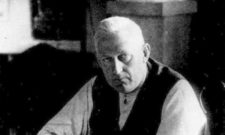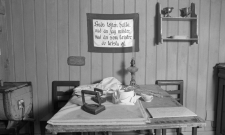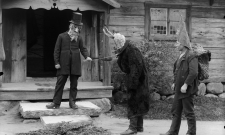Shop our historical maps

Dec
Published on 24 December 1924 in the column IDAG in Göteborgs Handels- och Sjöfartstidning (GHT).
It's a rare diversity of moods that have merged in the Christmas spirit. The celebration of the birth of their Saviour by Christian believers is neither the oldest nor the strongest influx. Ancient natural mysticism, ancient customs, once intended to control the course of nature, have merged with the mysterious sense of the presence of the Hansovnes. Up here in the North, where the winter darkness has brooded more heavily than over more southerly climes, the longing for sun and light has burst forth with particular force in the Christmas festival. The child in the manger has become the symbol of the budding life that reaches towards the future.
The life that sprouts, the light that breaks through, the love that haunts them and the power that keeps away the evil forces of destruction, that is the Christmas circle of ideas. It is one of the focal points around which human life revolves. The other is that of darkness, hatred and the evil will. The force of both of them is felt at every point in the course of history. At times they mingle and keep each other in calm equilibrium, at other times they break against each other and make events resemble foaming whirlpools and sucking maelstroms.
At the bottom of our being grows the sting for good and for evil. The desire to hoard and protect is there as well as the desire to torment and destroy. Deep down in the mire of instinctual life, deposited beneath countless genealogies, these desires suck their nourishment. Their root threads lead down to the animal existence not yet illuminated by any spark of Prometheus, fire. When a strong appeal sounds to one or other of the forces that move in the dim half-days of our soul's depths, it arouses resonance. Farsoter spreads no faster than the spiritual currents. A strong idea borne of passion is more contagious than bubonic plague, and at times more destructive. The soul-catching power of a field-cry is not its internal justification, but the passion with which it is uttered. Whether the instruction is to destroy or to build up, it is echoed by the masses.
It is this mass suggestion which will make the ideas appear as spiritual powers, living independently of the thousand or thousand individual souls which they possess. They seem to rise from unknown depths and irresistibly sweep men along with them, as they sweep furiously over the peoples. At the same time, they always condense into a concrete image for the spectators. A single individual appears as the embodiment of the idea. The idea hovers between the pole of the strongly expressed personality on the one hand and the contourless mood on the other. The idea acquires the characteristics of individuality and the personality is snatched from its natural environment into that which is worshipped.
It happens with both the forces of good and evil. How men form their minds from the idea they give their hearts is less important than the choice between them. There is often a dispute about ideas and conceptions, as if the important thing were what men thought. What is important is what they are like. Whether they wrap their good intentions in gaudy thought-blocks, or their evil purposes in glossy word-brooches, matters little. It is the choice of position that matters. Even to the most devastating raid on reason and culture, participants can be fired by good intentions. In fact, all power comes from honest conviction. It can be led astray, deceived and serve alien gods. That is the tragedy of human life.
However, it only goes for a limited time. When the good intention and the desired end are too little in harmony, the power of the good ebbs away. The movement must continue on its outer strength alone. It lasts a short time. What lacks inner justification always breaks down sooner than expected.
Only the rubble of what it smashed to pieces remains after it. Even the good ends lose their power over the minds; all is subject to the law of decay. But they become powerless only when better thoughts have sprung from them, and they have served as a lever for the good they wanted.
There is only one remedy for the spiritual plagues that sweep the earth. What they appeal to are the forces that lurk in the depths of the soul. Raise into full daylight as much as possible of our motives, and mass suggestion loses its grip. The clear, cool reflection, the habit of surrounding ourselves with the moat of critical trial, over which nothing may escape before the drawbridge is dropped after due credentials, that protects the fortress of thought against the surprise of mass thinking.
If it is said that it is love that makes men free, or that it is clear thought that loosens the links, there is no contradiction between these propositions. The good will and the cool reflection have an inner affinity with each other. Neither is viable without the other. To both flows power from the deepest streams of our soul's life. The mood that follows the rhythm of the seasons and the course of nature is the source of power for both. Christmas, with its inexhaustible wealth of dreams, dreams of burgeoning life and light and childhood memories, seems to have the power to melt, at least for a while, the ice that life's coldness places on the mind. It is not useless, even if only for a moment. The feeling that the Holocaust is out there, dark and endless, warms the heart and cools the mind. That desolate space is the backdrop of our lives. It gives everything the right proportions. Let Christmas symbolise the centre of our personal life. The good will and clear thinking create the unity of a life lived with this centre and with this background.
Photo: Gullers, KW / Nordiska museet (CC BY-NC-ND)
Subscribe to YouTube:
If you appreciate Allmogens independent work to portray our fine Swedish history and Nordic culture, you are welcome to buy something nice in the shop or support us with a voluntary donation. Thank you in advance!
Support Allmogens via Swish: 123 258 97 29
Support Allmogens by becoming a member
Support Allmogens in your will








